
A ground breaking radio tagging system which could save airlines and retailers millions of pounds, has won its creators a leading engineering entrepreneurship award.
With the skills gained here at Cambridge, he (Sithamparanathan) and Michael are very well placed to take the project forward, both in its technical development and in the commercial field. Winning this award will be a huge step towards realising their dream.
Professor Lynn Gladden FREng, a Fellow of the Royal Academy of Engineering and Pro Vice Chancellor at Cambridge University
Dr Sithamparanathan Sabesan, who has just completed a PhD in Engineering at Cambridge University's Corpus Christi College and Dr Michael Crisp, who is a research associate in the Cambridge University Engineering Department, scooped the Royal Academy of Engineering ERA Foundation Entrepreneurship Award for their research into a low-cost location sensing system, which could have major benefits for a wide range of businesses.
The Real Time Location System (RTLS) will allow businesses such as high street retailers and airlines which use tagging on high-end goods and passengers' luggage, to monitor cheaply and effectively the location of these items to less than one metre.
Current systems normally only allow for a proportion of tagged items to be detected under practical circumstances and are also not able to locate tags accurately in real time. Dr Sabesan's PhD research shows that the improved RTLS he is developing could be 100 per cent accurate as well as locating passive RFID tags with accuracy to within a metre. In combination these breakthroughs have enabled, for the first time, the low-cost tagging of items and the possibility of locating them at relatively high precision.
It is estimated that the system could save airlines in excess of £400m. Retail groups have also been engaged in the project, not just for tagging items, but also for the advancement of self-service checkouts, which have shown rapid growth in the past few years. The work was funded by the EPSRC TINA (The INtelligent Airport) project and the Boeing Company.
Dr Sabesan and Dr Crisp, received their awards at the Royal Academy of Engineering's annual Academy Awards ceremony at London's Guildhall. There, they collected a £10,000 personal prize, with a further £30,000 to invest in the development of their winning idea.
Dr Sabesan said: "Michael and I are absolutely thrilled to have been selected for this award by a panel of such respected judges and it is clearly a dream come true for me. We are incredibly proud and happy with the award. We now want to take this technology to the next level by developing custom firmware and hardware of a commercial prototype system and I hope the award and the research prize will act as a springboard to its success.
Dr Sabesan has been supervised by Professor Ian White, Pro-Vice-Chancellor for Institutional Affairs and Professor Richard Penty, Professor of Photonics at Cambridge University.
Professor Lynn Gladden FREng, a Fellow of the Royal Academy of Engineering and Pro Vice Chancellor at Cambridge University, who endorsed Dr Sabesan's application added: "In the course of his masters degree and doctoral research, Sithamparanathan Sabesan has worked extremely successfully on his RTLS project and gained invaluable experience in this field of engineering."
"With the skills gained here at Cambridge, he and Michael are very well placed to take the project forward, both in its technical development and in the commercial field. Winning this award will be a huge step towards realising their dream."
Sir Alan Rudge CBE FREng FRS, Chairman of the ERA Foundation, said: "I wish to congratulate Sithamparanathan Sabesan and Michael Crisp on their selection for this prestigious prize based on the development of very exciting tracking technology."
"The ERA Foundation is very pleased to be associated with the Royal Academy of Engineering in recognising and rewarding talented young entrepreneurs."
Dr Sithamparanathan Sabesan was born in Jaffna, Sri Lanka, in 1984. Dr Sabesan moved to the UK in 2004 to study BEng (Hons) Electronic Engineering at Sheffield University, where he scored highest marks in his year and awarded the Sir William Siemens Medal for being the country's top 18 science and technology students. He was previously with the Cambridge University spin off company ARM, as a student IP Electronic Engineer. He moved to Corpus Christi College, Cambridge University in 2007 to study for his Masters degree (MPhil) in Electronic Engineering before beginning his PhD in 2008. He has received a number of awards, has had his work published in various journals and currently has two patents pending for his work into RFID. A keen cricketer, Dr Sabesan has captained the Corpus Christi College MCR team and is also an elected president of University of Cambridge Graduate Cricket League and chairman of Institution of Engineering and Technology (IET) Cambridge Younger Professionals Committee. He has just been elected to a Junior Research Fellowship at Girton College, Cambridge University and recently won the UK ICT Pioneers Competition under the Connected World Category http://www.eng.cam.ac.uk/news/stories/2011/ICT_pioneers_award/.
Dr Michael Crisp received the Ph.D. degree in engineering for research on radio over fibre systems and distributed antenna systems from the Downing College, University of Cambridge, U.K., in 2009, having previously completed an MEng at Cambridge in 2005. He is currently working as a postdoctoral research associate again at the University of Cambridge, working on RFID distributed antenna systems and radio over fiber systems. In his spare time he is a keen windsurfer.

